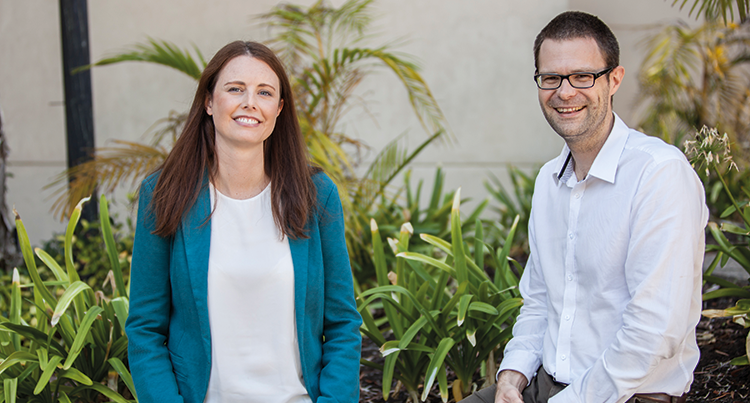Search
Research
Common variation near ROBO2 is associated with expressive vocabulary in infancyIn this paper we conduct a genome-wide screen and follow-up study of expressive vocabulary in toddlers of European descent from up to four studies of the...
Research
Evidence for Distinct Cognitive Profiles in Autism Spectrum Disorders and Specific Language ImpairmentThis finding supports distinct cognitive profiles in ASD and SLI and may provide further evidence for distinct aetiological mechanisms in the two conditions.

News & Events
New autism guideline a lifeline for familiesProfessor Andrew Whitehouse tells how Australia’s first national guideline for the diagnosis of autism spectrum disorder is going to transform the way the condition is assessed and managed, vastly improving the experience for families.
Research
Feasibility of a 2-minute eye-tracking protocol to support the early identification of autismWe tested the potential for Gazefinder eye-tracking to support early autism identification, including feasible use with infants, and preliminary concurrent validity of trial-level gaze data against clinical assessment scores. We embedded the ~ 2-min 'Scene 1S4' protocol within a comprehensive clinical assessment for 54 consecutively-referred, clinically-indicated infants (prematurity-corrected age 9-14 months).
Research
Which emerging autism features at 12 months of age are associated with later parent-child interaction?Parent-child interactions (PCI) in infants with an elevated likelihood (EL) of autism start to diverge from other infants toward the end of the first year. This divergence is often attributed to emerging features of autism impacting infant social interactions in ways that become increasingly amplified. The aim was to identify which, if any, 12-month autism features were associated with later PCI qualities.
Research
Influences of bilingual input on English vocabulary size and academic outcomes: a large-scale longitudinal study following children in Australia from five to ten yearsResearch from large population-based studies investigating the language and academic outcomes for bilingual children is rare. The current study aimed to investigate the influence of dual language exposure on (i) English vocabulary outcomes at 5 years (126 bilinguals, 1675 monolinguals), and 10 years (vocabulary: 92 bilinguals, 1413 monolinguals:), and (ii) academic outcomes at 10 years (107 bilinguals, 1746 monolinguals).
Research
Targeting intolerance of uncertainty in young children diagnosed with autism: A randomized controlled trial of a parent-mediated group interventionYoung children diagnosed with autism experience high rates of co-occurring anxiety, with uncertainty-related concerns commonly reported. This randomized controlled trial investigated an 8-week parent-mediated group anxiety intervention, “Coping with Uncertainty in Everyday Situations” (CUES-Junior©).
Research
“The Wrong Supports Are Worse than no Support”: Autistic Perspectives on Early-in-Life Infant Autism SupportsEvidence suggests that the earlier supports are provided to young Autistic children, the better the overall outcomes. Supports have typically only been available after an autism diagnosis but with increased knowledge about early developmental trajectories, clinical supports can now be offered prediagnosis for infants showing early autism features and/or those with a family history of autism.
Research
Multimodal brain features at 3 years of age and their relationship with pre-reading measures 1 year laterPre-reading language skills develop rapidly in early childhood and are related to brain structure and functional architecture in young children prior to formal education. However, the early neurobiological development that supports these skills is not well understood.
Research
Caregiver Psychological Distress Predicts Temperament and Social-Emotional Outcomes in Infants with Autism TraitsChild temperament and caregiver psychological distress have been independently associated with social-emotional difficulties among individuals with autism. However, the interrelationship among these risk factors has rarely been investigated.
